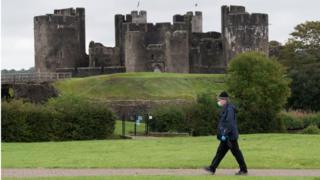 Image copyright
Getty Images
Image caption
Caerphilly residents are facing a local lockdown
Image copyright
Getty Images
Image caption
Caerphilly residents are facing a local lockdown
Local lockdown restrictions are being tightened in Bolton, which has the ''highest rate" of coronavirus in the country.
Caerphilly residents are also facing extra restrictions after coronavirus infections there rose rapidly.
Who decides which areas go into ''local lockdown,'' and what does it mean for you?
Why are there local lockdowns?
In a bid stop local coronavirus outbreaks, areas with high infection rates can be locked-down, or have extra restrictions.
This could mean locking down a hospital or factory, or even a whole city.
Local authorities in England have powers to:
Close specific premises (such as shops, cafes and gyms) Shut outdoor spaces (such as parks, playgrounds and beaches) Cancel events (such as concerts, weddings and sporting events)Ministers can:
Close sectors or types of premises in local areas Introduce localised stay at home orders Reduce the maximum size of gatherings Restrict the use of transport Stop people leaving a certain area Image copyright Reuters Image caption Oldham in Greater Manchester is one of the places currently under a local lockdownWhat triggers a local lockdown?
There is no set level of infection that triggers a local lockdown.
But if an area posts more than 40 coronavirus cases per 100,000 people, it is likely that extra restrictions will be considered.
For example, measures were introduced in Caerphilly after it registered 55.4 coronavirus cases per 100,000 population. This was the highest rate in Wales.
Image copyright Getty ImagesHowever, the number of infections is not the only factor considered.
For example, cases in Northampton jumped to 125 per 100,000 in August. But as the rise was almost entirely down to workers at a local factory no local lockdown was introduced.
Local decision-makers have a framework they can use to decide whether their area should be placed under extra restrictions to protect the public..
Which areas are in lockdown?
As of 8 September, parts of north-west England, West Yorkshire, Leicester, Glasgow and Caerphilly are under local lockdown.
People in Caerphilly county are being told not to leave without good reason and should not meet indoors with anyone outside their household People living in Manchester, Salford, Rochdale, Bury, Bolton Trafford and Tameside and Leicester City cannot meet anyone outside their own household, or support bubble, in a home or garden In Bolton, where there are 120 cases per 100,000 people, there will also be visitor limits on care homes, while hospitality venues will only be able to serve takeaways and must close between 22:00 and 05:00. People living in Glasgow City, East Renfrewshire and West Dunbartonshire are banned from meeting people from another household inside their home Image copyright PA Media Image caption A local lockdown is in force in some parts of GlasgowLocal lockdowns are regularly reviewed and when the number of infections falls, the restrictions start to be eased again.
Restrictions in Aberdeen have now been lifted, while two households can now meet indoors again in Stockport, Burnley, Hyndburn and some parts of Bradford and Kirklees.
You can find out online which places in England, Scotland and Wales have imposed extra restrictions. Northern Ireland has not yet introduced any local lockdowns.
What is an 'area of concern'?
Public Health England publishes a weekly list of areas where rising infection rates are becoming worrying.
It separates them into "areas of concern", "areas of enhanced support" and "areas of intervention".
This means it could do more testing in care homes or with communities it thinks are at higher risk. It could also close down individual venues such as a pub.
Can police enforce a lockdown?
Police have powers to enforce a local lockdown. For example, if they believe that somebody is staying away overnight, they can tell them to return home.
They can also fine people for breaking the rules, and may issue a "prohibition notice" directing somebody not to do something.
But if a resident from a locked-down area wanted to go to a bar in another part of the city, for example, there is nothing legally to stop them.
Instead, the government hopes people's sense of civic responsibility will see them follow guidance to stay at home.

 5 years ago
638
5 years ago
638 

